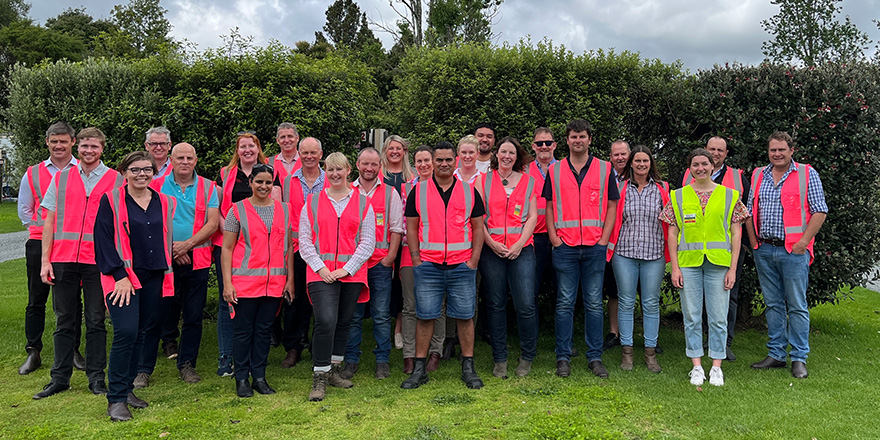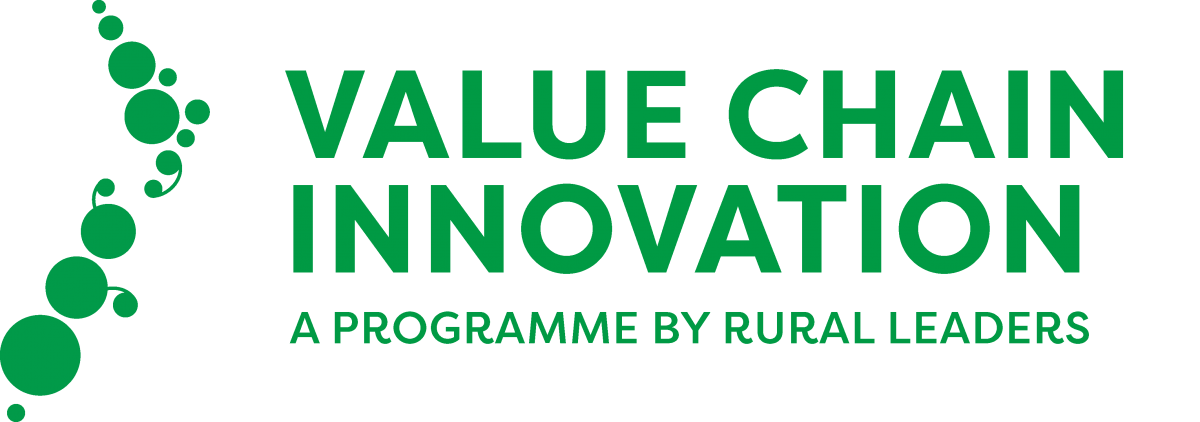Rural Leaders and Lincoln University have just wrapped up a collaborative delivery of The Value Chain Innovation Programme, a seven-day bus tour of New Zealand’s four major sectors: dairy, red meat, kiwifruit, and apples.
A fully subscribed programme of 22 students, including senior growers, farmers, consultants, industry professionals and government took part in this North Island value chain immersion.
“The carefully selected combination of participants on the programme resulted in many varying opinions coming together in positive debate, to solve problems constructively.
This was helped in no small part by facilitators Professor Hamish Gow and Cllr. Phil Morrison, who laid out a framework at the start of the programme, to help us really dig into what we were seeing,” said Kylie Leonard, 2023 Nuffield Scholar and programme participant.
The Value Chain classroom on wheels.
The bus itself became a rolling classroom for the week-long immersion. Between visits, back on the bus, students discussed, debated and unpacked insights and issues as they arose. Onboard, critical reflection resulted in ten key issues being agreed on.
“One of these issues is that New Zealand is still moving from volume to value and there’s a lot of players who are still volume based – but that’s ok. They run a value chain model that creates value out of volume, whereas others are moving to value-add.
The big example here was non-IP apples at $2 per kilogram in the supermarket, versus Rockit Apple NZ which gets $2.99 for a 76-gram container – as sold at some service stations in Napier. This translates to about $39 per kilogram,” said Professor Hamish Gow, Programme Facilitator.
An immersive learning process.
Perhaps critical for the students was the participatory process, the action-based learning, and the process of engagement where an entire value chain is walked – from one end to the other.
Comparative analysis was used to understand how the many firms create, capture, and distribute value in their respective value chain comparatively across four sectors.
“It’s that depth of understanding people gain once they do the comparative analysis. It allows you to get to the crux of how a value chain operates and what’s critical.
That’s what we built within the programme – a platform for people to rapidly evaluate and understand how firms create value and whether they were effective in the way that they were trying to do this, then how they capture and distribute it, along with implications of that for industry,” said Prof. Hamish Gow.

A framework for unpacking value chains.
Three separate value chain discipline alignment models were explored during the programme: Operational Excellence, an efficiency value model – like Fonterra. Product Leadership – a technically superior product – like Zespri. And finally, Customer Intimacy – as in First Light Foods or Rockit Apples.
“Firms such as Fonterra follow more of an Operational Excellence discipline, that’s driven by volume. In Operational Excellence, you create value from volume, efficiency and scale economies.
In Product Leadership, you must invest a lot of time and money in R and D, innovation, and brand to create a technically superior branded product. Several students suddenly realised that it’s a 15-to-20-year lead for commercialisation for a new version of kiwifruit or apple.
In Customer Intimacy, firms focus on gaining deep insights and understanding of their customers and addressing their concerns.
Exceptional firms and value chains excel in one discipline alignment and are above average in other two disciplines as well,” added Prof. Hamish Gow.
Where to next for the Value Chain Innovation Programme?
Participants canvassed felt the programme was a huge success and well worth the significant time investment away from family and work commitments.
“Everyone came out fizzing. Everyone realised within the first day that the bus was a safe haven where we could engage in challenging discussions and debates.
It was refreshing, exhilarating and it changed mindsets. Everyone wanted to replicate the experience and insights on a larger scale. How could we scale it to tackle the large issues confronting NZ primary industries? I think we’ll do the South Island sometime in 2023,” concluded Prof. Gow.
It seems pairing up with a South Island Programme is likely – and potentially an international version too. At some point in the future, this may become the next logical step – post Kellogg Rural Leadership Programme – in primary industries leadership development.




























